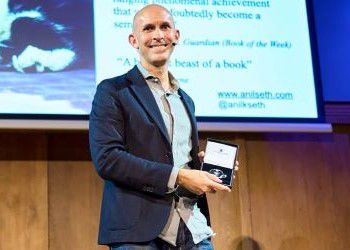Professor Anil Seth receives inaugural Rationalist Press Lecture Medal
Posted on behalf of: Internal Communications
Last updated: Thursday, 6 November 2025

Pictured: Professor Anil Seth. Picture credit: Simona Sermont
Professor Anil Seth, Professor of Cognitive & Computational Neuroscience in the School of Engineering and Informatics and Director of the Centre for Consciousness Science has been awarded the inaugural Rationalist Press Lecture Medal. He delivered the accompanying Voltaire lecture at Conway Hall in London on 31 October.
The medal recognises Professor Seth's pioneering research on understanding the human condition and his work championing a naturalistic view of mind and self. Andrew Copson, Chief Executive of Humanists UK, presented the award following Professor Seth's lecture on consciousness and artificial intelligence.
Reflecting on the lecture, Professor Seth said: “Giving the 2025 Voltaire Lecture was a true honour. It was a timely opportunity to emphasise why ‘conscious AI’ is very unlikely, and explore the challenges posed by AI systems that give the appearance of being conscious - without actually feeling anything at all. Humanism provides a highly suitable framework for thinking through our responses to these challenges. I particularly enjoyed the question-and-answer session - there were some outstanding questions from a very diverse audience.”
About the lecture
In his lecture, Anil addressed fundamental questions about the nature of consciousness and whether artificial intelligence could ever achieve true awareness. Drawing on his theory of perception as a ‘controlled hallucination’ he explained how our brains constantly predict and construct our experience of reality rather than passively receiving it. He argued that consciousness is fundamentally about being rather than doing, what it feels like to exist, rather than simply the ability to compute or act. He illustrated this distinction through visual illusions and experiments, including the Dreamachine, which allows people to experience the patterns of their own perception.
He suggests that consciousness likely depends on life itself, on the biological and metabolic processes that sustain us. He concludes that while AI may become increasingly capable, it is unlikely to achieve genuine consciousness.
The lecture also addressed pressing ethical concerns about creating machines that appear to be conscious, even if in fact they are not. Anil warned of the dangers such convincing simulations pose in exploiting human empathy, trust, and attachment, emphasising the importance of guiding technological progress with humanist values: curiosity, empathy, and scientific understanding.
You can read more about the lecture on the Humanists UK website.
